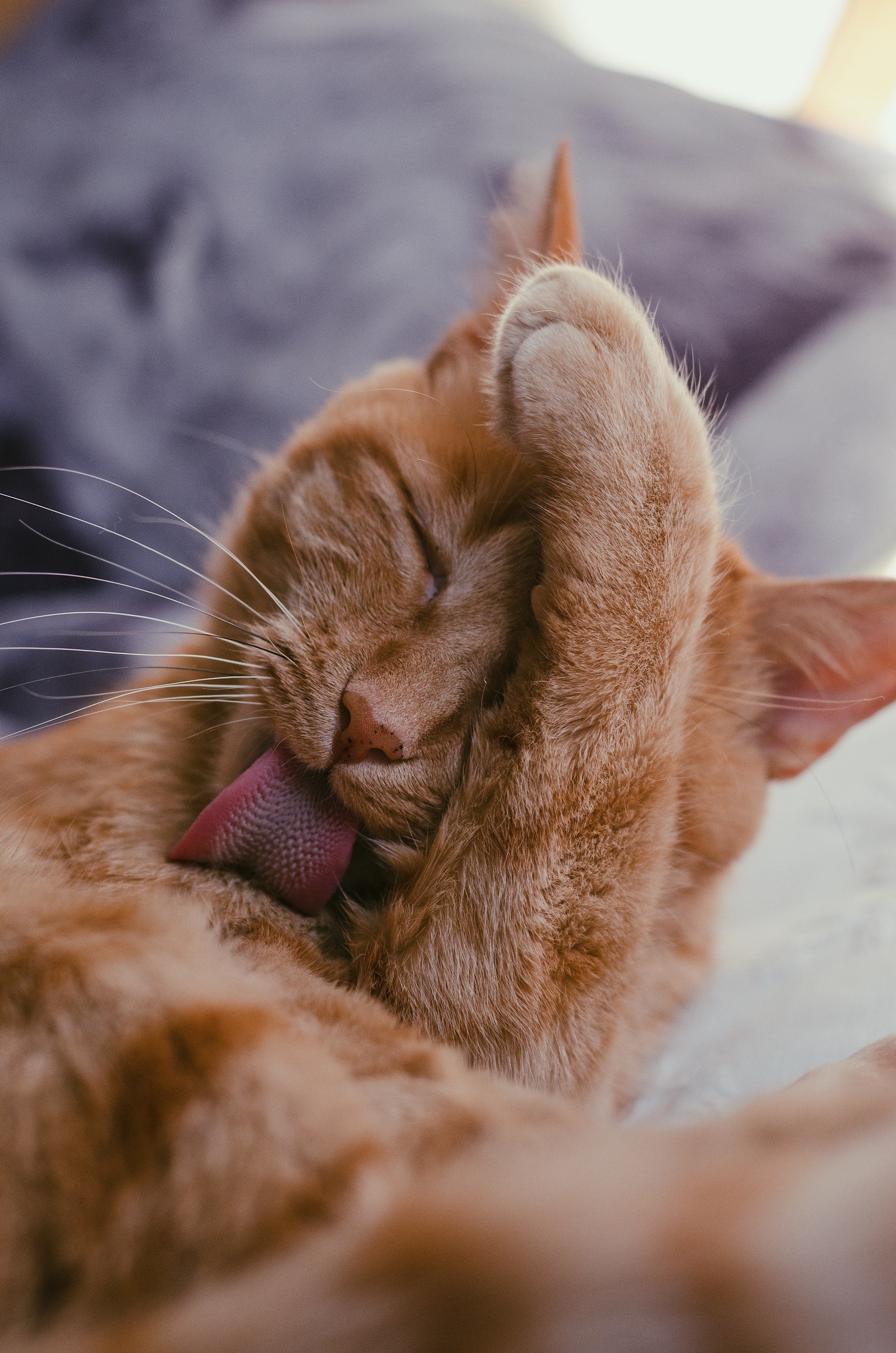A healthy kitty is a happy kitty, and cat hygiene is a crucial aspect of your pet’s overall health.
Cats are notorious for their independent, self-sufficient ways. That being said, there are still several supplemental steps you can take as a pet owner when it comes to keeping your cat clean, happy, and healthy.
Understanding Self-Grooming
Cats learn to groom themselves as kittens, and continue this habit throughout their lives. If your cat has ever licked you, you’ve likely felt that rough, sandpaper-like texture on the tongue. That’s because felines have tiny hooks called papillae on their tongues, which help to comb through the fur and pick up dirt and debris as they lick themselves.
There are several reasons behind your cat’s self-washing techniques. As your kitty licks herself, she is also:
- Stimulating sebum production (oily secretion) to keep the skin healthy.
- Spreading sebum throughout her coat to protect the fur and give it a healthy shine.
- Removing loose fur, dirt, and parasites from her coat.
- Preventing matted fur.
- Spreading saliva to cool off, since cats don’t sweat much (or pant like their canine counterparts).
- Comforting herself. Like kneading, grooming can be a comforting tactic when your furry friend is feeling stressed or is unsure how to respond to a situation.
When it comes to those hard-to-reach spots, cats have to get a bit more creative. Perhaps you’ve seen your cat lick her paws and then wipe her face, head, and ears. If you have multiple cats, you may see them engage in mutual grooming. Licking each other isn’t just an efficient cat washing practice, though—it can also be a sign of love and affection.
To support your cat’s healthy skin and coat, try PetHonesty’s Omega-3 Fish Oil. Additionally, watch for signs of both neglect or overgrooming, as this could indicate physical or mental health issues.

Do Cats Need Baths?
Since cats spend so much time grooming themselves, they’re pretty self-sufficient when it comes to hygiene. However, there may be times when your cat needs some extra cleaning assistance, such as when she’s exceptionally dirty, sticky, or smelly. (Basically, if your cat needs a bath, you’ll know.)
For best cat washing practices, take the appropriate steps:
- Always brush before bathing.
- Trim your kitty’s claws (for your own safety!)
- Use a hand-held spray hose, cup, or pitcher to control the direction of the water. Use a damp washcloth instead of spraying directly at the face.
- Place a slip-proof mat in the tub or sink.
- Use lukewarm water—NOT hot.
- Use a cat-friendly shampoo, such as PetHonesty’s Allergy Itch Relief Shampoo which can help to relieve itching and soothe skin issues. Gently massage from head to tail, following the direction of hair growth. Be sure to rinse all shampoo thoroughly.
- Dry your kitty in a large, dry towel and offer plenty of treats as a reward!
Brushing
Some cats love being pampered, and brushing is a great way to make your kitty feel like she’s at the spa. Plus, it’s a great way to spend some quality time together.
Brushing also helps to:
- Remove loose fur and keep shedding under control.
- Remove dirt, grease, and debris from the coat.
- Prevent matted fur.
- Boost blood circulation, which can improve the overall skin and coat.
One or two brushing sessions per week is sufficient for short-haired cats, with long-haired cats needing more—sometimes daily.
Ear Care
Your cat’s hygiene isn’t limited to her fur and coat. Monitor your cat’s ears on a regular basis for debris, discharge, swelling, excess wax, odors, or pests such as ear mites. For routine cleaning, use a vet-approved ear cleaner to gently wipe away wax or debris. Avoid getting inside the ear canal, as this could cause further problems.
If your kitty is frequently shaking or tilting her head, or seems to have more trouble balancing than usual, she may need to see the vet for possible ear issues.

Paw Care
Don’t declaw your cat. Instead, make sure you have plenty of cat-friendly scratchable surfaces around the house, and/or trim your kitty’s nails regularly to maintain her nails.
Check your cat’s paws regularly to make sure they’re clean and free of wounds, debris, or infection. This is especially important since your cat uses her mouth to clean herself, and you don’t want her to ingest any harmful debris or chemicals.
Dental Care
Dental wellness is another crucial aspect of your cat’s overall health. Brush your cat’s teeth on a regular basis using a feline-friendly toothpaste, and offer dental treats and chew toys to keep plaque at bay.
Be sure to provide your cat with a healthy, balanced diet as well. In some cases, cats may need specific vet-prescribed dental diets to keep their pearly whites healthy.
Other Tips
The cleaner the environment, the cleaner the cat. Clean the litter box on a regular basis to keep your cat happy and avoid bathroom incidents in other parts of the house.
Flea bites are the most common cat allergy, so be sure to stay up-to-date with preventative treatments. Vacuum your home regularly to remove any potential pests, especially if your cat likes to spend time both outdoors and indoors.
Sources:
https://pets.webmd.com/cats/ss/slideshow-clean-home-healthy-cat
https://www.thesprucepets.com/understanding-cat-grooming
https://pets.webmd.com/cats/guide/cat-grooming













